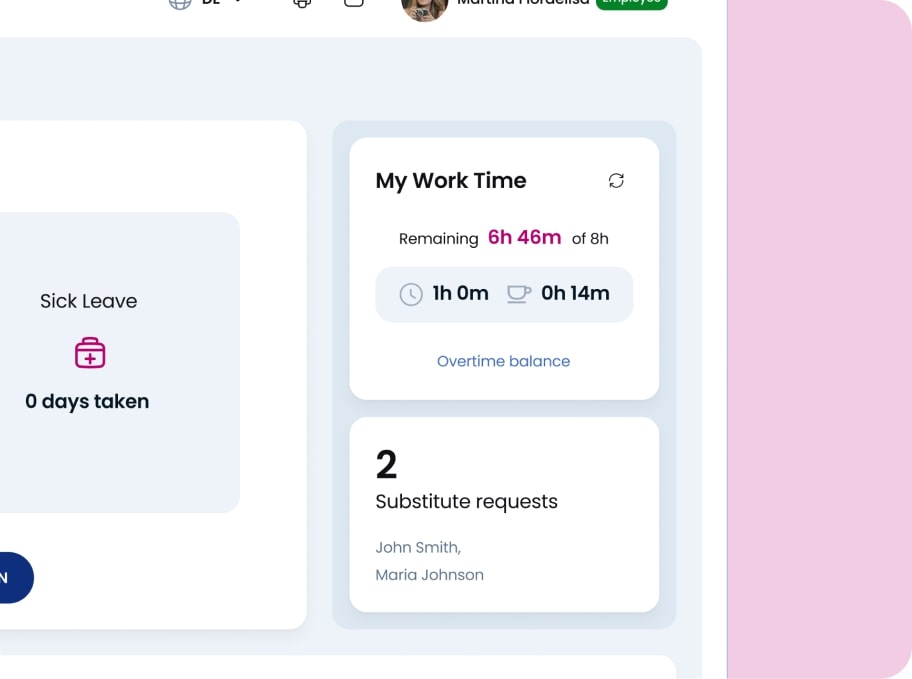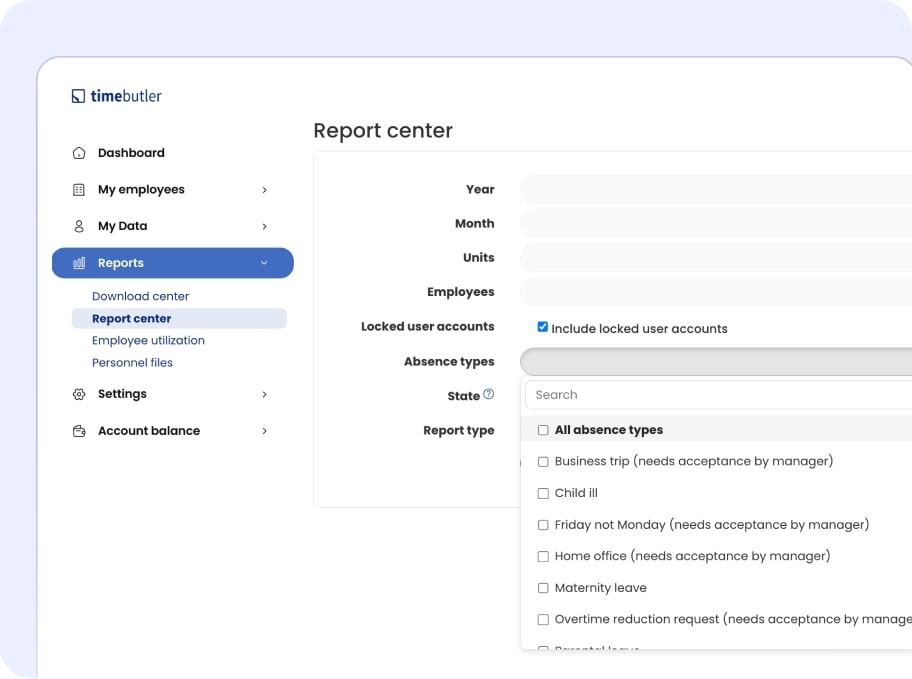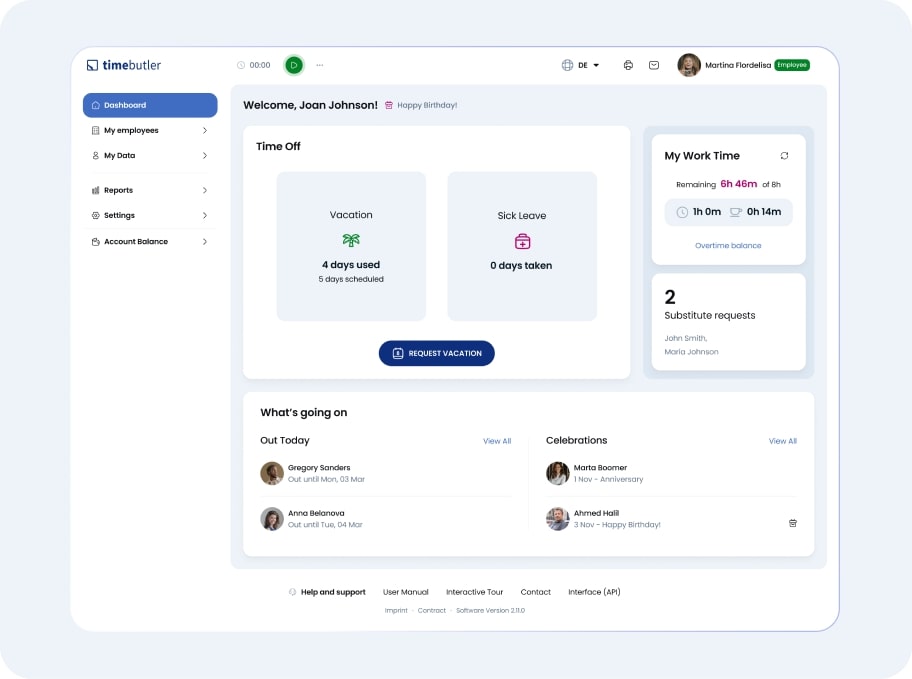If you’re a distributed company with employees in Germany, have just set up a German office, or are based in Germany, you might be confused about which German labor laws apply to you and how to make sure your business complies with them.
This guide will cut through the legalese. We’ll provide a quick overview of the labor laws you should know about, possible penalties for violations, and how online time tracking keeps you compliant.
An Overview Of German Labor Laws
There are three main regulations related to labor laws and working time.
1. Arbeitszeitgesetz (Working Hours Act)
The Arbeitszeitgesetz is a comprehensive act that has implications for how you track your employees’ working hours.
What the Arbeitszeitgesetz mandates:
- Employees must work no more than 8 hours daily and 48 hours weekly. Under some conditions, it can increase to 10 hours per day as long as the 6-month average doesn’t exceed the original 8 hours per day.
- Employees must have a minimum break of 30 minutes after 6 hours of work. They must also have at least 11 consecutive hours of rest between workdays.
- Sunday and holiday work is generally prohibited except in specific industries (e.g., healthcare, hospitality).
- Employers must document all work that exceeds regular daily hours (i.e., overtime beyond 8 hours/day).
2. Bundesarbeitsgericht (Federal Labor Court) Ruling (2022) Case No. 1 ABR 22/21
The Arbeitszeitgesetz mandated that employers must document all hours worked that exceed regular daily hours. But Bundesarbeitsgericht Ruling (2022) Case No. 1 ABR 22/21 further highlights the obligation for all employers to track all hours worked.
The implications of Bundesarbeitsgericht Ruling (2022) Case No. 1 ABR 22/21:
- You must implement a system (manual or digital) that accurately captures all hours worked.
- You can’t and mustn’t rely on employees to self-report informally.
- Simply having a written policy without a way to enforce it is not enough.
3. General Data Protection Regulation (GDPR)
GDPR is a data privacy regulation in the European Union (EU) and the European Economic Area (EEA). Because formal time tracking means collecting and storing employee data, GDPR compliance is essential.
What GDPR means for your business:
- Transparency: Employees must know what data is collected, why it’s collected, how it’s used, and for how long it’s stored.
- Consent (when necessary): If the time tracking involves methods beyond what’s legally required (e.g., GPS tracking), you may need explicit consent.
- Data minimization: You may only collect data that is necessary for compliance.
- Security: You must secure employee data, including time records, against unauthorized access, loss, or leaks.
- Right of access & correction: Employees have the right to see and correct their records.
What Happens If You Don’t Comply With German Labor Laws?
If you aren’t compliant with these laws, you leave yourself open to several risks. For example, violating the Arbeitszeitgesetz could lead to fines of up to €15,000 or even criminal prosecutions. You could also face lawsuits from employees suing for damages or back pay.
“Less severe” violations of GDPR could lead to fines of up to €10M, and some companies have faced fines of hundreds of millions of Euros for more serious infractions.
On top of these, you risk negative press and reputation, reducing opportunities to make a profit or hire new employees.
5 Ways Automated Time Tracking Helps You Comply with Labor Laws
Bundesarbeitsgericht Ruling (2022) Case No. 1 ABR 22/21 means you must have a formal time-tracking system to log all hours worked. There is no guidance about how you should do that, though.
It can be tempting to do this manually with free tools like Google Sheets.
But manual time tracking often leads to compliance issues because of:
- Human error (intentional or otherwise)
- Lost records or deleted records
- No assistance when it comes to audits
- GDPR risks with unprotected spreadsheets in shared folders
Automated time-tracking with a specialized tool eliminates these problems. Let’s examine how it does this.
1. Automatic and Accurate Records
German labor law now requires all working hours, not just overtime, to be recorded (Bundesarbeitsgericht ruling, 2022, Case No. 1 ABR 22/21). The Arbeitszeitgesetz also mandates regular breaks.
Manual tracking leaves too much room for error: employees log hours late, forget to enter breaks, or miss entries. That means you’re missing critical data and might not realize someone’s working more than legally allowed.
Time-tracking software captures hours in real time. Employees clock in as they start work—whether at the office or remotely—and clock out for breaks and at the end of the day. No delays, no gaps, just accurate records you can rely on.
How Timebutler helps:
Timebutler includes real-time tracking of working hours. You see who’s working and who’s on break. You know exactly how many hours they can legally work for the remainder of the day. You know who’s working too much or not taking enough breaks there and then. No delay in getting the information.

2. Customization
Sometimes you’ll need to set different rules for different people within your organization. Let’s look at an example:
You’re a fully remote marketing agency. Most of your staff live and work in Germany. Three are in France. And 2 are in Canada.
Staff in Germany and France are covered by the GDPR. Canada has its own data privacy laws. Your German staff is covered by the Arbeitszeitgesetz. However, your staff in France and Canada must follow their local labor regulations, not yours.
Now, you need to comply with two different data privacy laws and three different labor laws. Doing this manually is almost impossible, but specialized time-tracking software can help.
How Timebutler helps:
Timebutler is GDPR and Arbeitszeitgesetz compliant. With robust customization features, you can set individual working hours, breaks, and vacation regulations. There are more than 30 time-recording settings to choose from. No matter how complicated your compliance situation is, Timebutler makes it easy.
3. GDPR-Compliant Data Handling
A good time-tracking system ensures data security & transparency — a key consideration when complying with GDPR.
Employees can access their information at any time. And their data is protected. You don’t need to worry about the wrong person accessing the spreadsheet in your shared drive because the time-tracking software allows you to control permissions easily.
How Timebutler helps:
Timebutler allows you to customize and control permissions so only the right people can access data. You are in complete control of who can access, edit, and use employee data.
4. Easy Audit Preparation
If you ever get audited and you only have a manual tracking system, get ready for countless hours chasing down files and documents. Spreadsheets and files scattered across multiple drives and folders make audit preparation extremely difficult.
But with time-tracking software, you get centralized records in secure storage, and downloadable reports ready to use in audits.
How Timebutler helps:
Timebutler’s report center allows you to export employee data in reports that meet compliance criteria. Whether it’s working hours, personnel files, or vacation information, it’s all available in visual reports.

5. Employee-Friendly
Under GDPR, employees have the right to access and correct their personnel records. A digital time-tracking tool acts as a one source of truth for your timekeeping information. Employees can view, edit (in some cases), and understand their own records in one place. It reduces the burden on HR teams responding to simple questions. And it builds trust between you and your employees.
How Timebutler helps:
Timebutler’s employee dashboard gives each employee their own dashboard that tracks work hours, vacation time, sick leave, and overtime in real time.

Timebutler Takes The Stress Out Of Compliance With German Labor Laws.
German labor laws are strict but manageable with Timebutler, a tool designed for automatic time tracking. Timebutler is compliant with German labor laws and GDPR. You can also customize your settings to comply with regulations in other locations. Your data is secure and accessible, so you’re ready in case of an audit. And your employees get transparent access to their data.
Start your free Timebutler trial to set up a time-tracking system compliant with German labor laws.